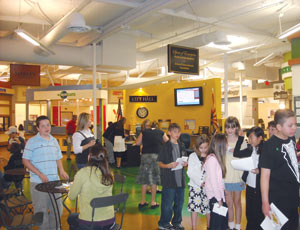In two months, hordes of would-be craft superintendents and construction CEOs will again descend on a unique training facility in Tempe, Ariz., to perfect skills in backhoe operation, bid preparation and workforce management, among other key industry tasks. These prospective managers may be only 4 ft tall and in elementary school, but they wield hardhats, solar panels, business plans and Palm Pilots like the seasoned professionals program boosters hope they choose to become.
The program is sponsored by the national Junior Achievement (JA) organization, which seeks to educate young students, particularly minorities and those at risk of dropping out of school, in “real world” subjects such as job seeking, entrepreneurship and financial literacy. Instruction is both in class and at 28 interactive sites around the U.S. that simulate how businesses work in a typical American town. The learning labs, known as “BizTowns,” have for years allowed fourth-through-sixth graders to spend a half-day experiencing career and business fields such as banking, media and travel, but construction was not included until now.
Beginning last September, with completion of a new 6,000-sq-ft BizTown facility and local industry financial and technical support, Junior Achievement of Arizona Inc., Tempe, became the first in the U.S. to showcase the industry. “We wanted our BizTown to be representative of the economy, so construction was a natural fit,” says Joyce Richards, Arizona program president.

RICHARDS
Proponents hope the learning lab, called the Building Arizona Co., will change misperceptions about construction and entice students, parents and teachers to understand its career-building potential. “The kids experience what small businesses do,” says Richards. “You’re deemed successful if you can generate revenue to pay off your business loans and make a profit. It helps students envision themselves as workers and producers.”
This September, about 250 schools in Arizona will again participate in BizTown. Before a group of 130 students arrives each day for the site experience, they devote 19 hours of class instruction to prep work such as researching job fields, interviewing with actual practitioners, buying business licenses and developing marketing plans.

WEISE
The BizTown construction day is a flurry of movement and decision making as students follow a scripted plan to solicit clients among other site businesses, check designs, prepare bids, perform craft work, invoice and get paid, says Tom Weise, former facilities director for Intel Corp. and a catalyst for the program, the only Biztown that provides students with Palm Pilots. “We need to get students onto the construction path, whether it is management, engineering or labor,” Weise says. “Shame on us if we don’t facilitate that.”
Industry supporters also enjoy the site experience. “The second I walked in the door, I wanted to be part of this,” says Mike Greenawalt, southwest operations manager for Rosendin Electric Co., Tempe. “It is fun to watch the kids set price points and [try to]make money.”
Proponents want to expand the construction segment to other JA Biztowns. Doug Pruitt, CEO of Tempe-based Sundt Construction Inc., has committed his firm to five years of financial support and calls for an industry coalition to develop long-term funding.
Richards says the program is still viable despite the economic downturn. “It is a good time to bring attention to the JA program,” she says. “The next generation must be better prepared.”














Post a comment to this article
Report Abusive Comment